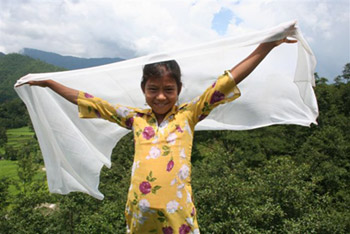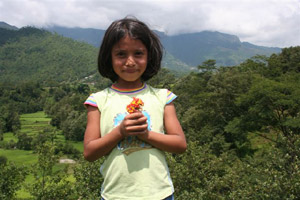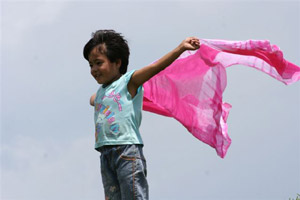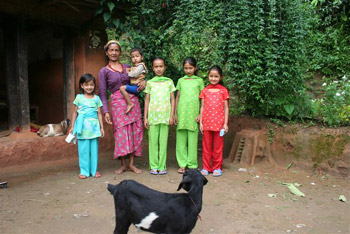 The mother hears the footsteps of her husband walking out the door. “Well,” she thinks, “maybe this is good; one less mouth to feed, one less set of despairing eyes watching me and waiting.” The early sun cleanses the forest of the night’s blackness, her mountaintop home revealed among the glistening dew, among too many singing birds, too much beauty mocking her despair.
The mother hears the footsteps of her husband walking out the door. “Well,” she thinks, “maybe this is good; one less mouth to feed, one less set of despairing eyes watching me and waiting.” The early sun cleanses the forest of the night’s blackness, her mountaintop home revealed among the glistening dew, among too many singing birds, too much beauty mocking her despair.
Her four young daughters sleep tumbled together at the rear of the dark room, just out of the rising sun’s reach. Her four-year-old son sleeps, still, in the warmth of her bed. She collects twigs to start the morning fire. Rice and tea, then a day of backbreaking farming on the steep hillside, await the family. The school closed when the only teacher walked away the month before; the men all seem to leave, some with promises to send money, some like her husband silently in the dark.
 Kul Bhadur, worn thin, tired and hobbled by an unknown disease removing the muscles from his frame, heard them come again. The Maoists have come so many times in the past years that he knows some of their names. The young and the strong men of his village have all fled or been conscripted by the rebels over the years.
Kul Bhadur, worn thin, tired and hobbled by an unknown disease removing the muscles from his frame, heard them come again. The Maoists have come so many times in the past years that he knows some of their names. The young and the strong men of his village have all fled or been conscripted by the rebels over the years.
Two young girls in neatly worn jungle fatigues enter the house while the other soldiers wait outside. The girls with their long black hair tied back, bodies quick and strong, eyes fierce with determination, grab the rice sack and demand any money be handed over. Kul’s wife stands shielding her daughters, ten and twelve years old, and Kul can only watch helpless, voiceless. The room is small, the search quickly over. They grab Kul’s wife and lead her to the door. Her daughters scream and clutch their mother, but the soldiers scream louder and the girls let go.
Outside, the mother is forced into the back of a large truck. Kul and his daughters are pushed away from the house as a rebel douses it in gasoline. Kul’s watery eyes reflect the orange flames of his home as they watch the truck taking his wife drive away.
 Depa is the fastest runner in our home. Each morning we run before exercise, I see in her effortless stride the speed, power, and grace of an elite runner, though she is only twelve. She’s a quiet girl with a soft smile, and the protective big sister to Sila, two years younger. Their father’s name is Kul; their mother is missing. I used to always lead the run, but Deepa now charges past me, silent and focused. I know that this is not mere running; it is a daily catharsis. There is a truck, invisible to the rest of us, which she is chasing. Both girls have small scars scattered here and there that are “nothing” when I ask. In the months since their arrival they have blended very well with all our other children, laughing, working hard in their studies, letting childhood return. They ask for nothing and like all our children are so full of compassion and comfort to those around them.
Depa is the fastest runner in our home. Each morning we run before exercise, I see in her effortless stride the speed, power, and grace of an elite runner, though she is only twelve. She’s a quiet girl with a soft smile, and the protective big sister to Sila, two years younger. Their father’s name is Kul; their mother is missing. I used to always lead the run, but Deepa now charges past me, silent and focused. I know that this is not mere running; it is a daily catharsis. There is a truck, invisible to the rest of us, which she is chasing. Both girls have small scars scattered here and there that are “nothing” when I ask. In the months since their arrival they have blended very well with all our other children, laughing, working hard in their studies, letting childhood return. They ask for nothing and like all our children are so full of compassion and comfort to those around them.
 Four sisters share a room in our home, each with her own bed; yet sometimes when I go to wake them for exercise I find them sleeping tumbled together in peace. I draw open the curtains and the room fills with the light of the rising sun and with birds singing, highlighting the joy and security of these happy hearts. The bleak future that was graying their young eyes has cleared. Life has been restored and sparkles brightly in children at ease with life, giggling back and forth, giddy with the strange twist of fate that delivered them here.
Four sisters share a room in our home, each with her own bed; yet sometimes when I go to wake them for exercise I find them sleeping tumbled together in peace. I draw open the curtains and the room fills with the light of the rising sun and with birds singing, highlighting the joy and security of these happy hearts. The bleak future that was graying their young eyes has cleared. Life has been restored and sparkles brightly in children at ease with life, giggling back and forth, giddy with the strange twist of fate that delivered them here.
These are two of the histories belonging to our children. We have thirty-four. My name is Michael John Hess. Shortly after my fiftieth birthday I came to Nepal, a first trip outside the United States. I was staggered by what I found. Life in many parts of the world is a living hell. It is simply not possible to witness the burden of others’ lives and not do something about it. I confess to always having had a sense that people are in most part responsible for their own destinies and that a determined person can rise through any impediment to make their lives better. This was the first layer of misunderstanding to be removed in my journey to awareness.
 Nepal has been embroiled in an insurrection for the past ten years. During this time, the countryside, where 80% of the people live, have had to endure school closings, conscription, torture, and crop loss because of an often fickle nature that brings drought to heavily populated areas completely dependent upon crops to survive. Through all this the people remain cheerful and determined. I have never met harder working people, especially the women of Nepal. They strive, ask for nothing, sweat blood everyday from sunrise to sunset, but they still are humbled by the forces against them.
Nepal has been embroiled in an insurrection for the past ten years. During this time, the countryside, where 80% of the people live, have had to endure school closings, conscription, torture, and crop loss because of an often fickle nature that brings drought to heavily populated areas completely dependent upon crops to survive. Through all this the people remain cheerful and determined. I have never met harder working people, especially the women of Nepal. They strive, ask for nothing, sweat blood everyday from sunrise to sunset, but they still are humbled by the forces against them.
The geography of Nepal is beautiful and diverse, going from desert to jungle to the high country in the Himalayas. Each region has its own set of problems, and the government has not been able to even slightly assist the people. Education is hit or miss, yet children will walk for two or three hours to school if only a teacher will show up.
 Recently the people succeeded in overthrowing the king’s government and are preparing now to enter a new era of constitutional democracy. Things are looking up. At the same time, the country remains bankrupt and it will be years before any real social services are even attempted. We have a staff of six “didis,” “sisters” in Nepali. Our facilities for both are very good, and our reputation is now known in many remote areas of Nepal. Counting the help we offer to local villagers, we assist around 300 people on a regular basis.
Recently the people succeeded in overthrowing the king’s government and are preparing now to enter a new era of constitutional democracy. Things are looking up. At the same time, the country remains bankrupt and it will be years before any real social services are even attempted. We have a staff of six “didis,” “sisters” in Nepali. Our facilities for both are very good, and our reputation is now known in many remote areas of Nepal. Counting the help we offer to local villagers, we assist around 300 people on a regular basis.
Turning to my brother Peter Hess, a Davidson College economics professor with a deep background in the economics of developing nations, for advice, I have tried to make sure that each dollar spent not only takes care of immediate needs but finds a way to work towards an eventual self sustenance. Next year we will be charging the students from other private schools that have asked to attend our school. This will create a revenue flow that will help the school to pay for itself. Many students, including our orphans, however, will continue to attend free. We will have to rely on donations to cover the cost of the orphanage. One hundred percent of every dollar received from donors goes directly into the existing programs.
Papa’s House is a very happy home, full of laughter and compassion, hard work, and love. Everybody pitches in to help. These children are now living in a safe environment from which they will be able to focus on developing strong minds and open hearts, the children come from all regions near and far, and not in every case are they orphans, but in every case they have been rescued from life-threatening situations.
